Picture this: you’re a long-haul truck driver, logging countless hours on the open road. Or maybe you’re a radiologist, analyzing scans and diagnosing diseases. Perhaps even a retail worker, helping customers find that perfect item.
You’ve spent years mastering your craft only to hear whispers of AI taking over jobs like yours. These questions gnaw at you: What jobs will AI replace? Is my job safe?
You’re not the only one questioning how AI might shape our future – many professionals are asking the same thing.
In this guide, we will explore what jobs will AI replace and which jobs AI could actually be beneficial.
Know what lies ahead so you can prepare for a future with AI.
Table Of Contents:
- What Jobs Will AI Replace?
- Transportation
- Healthcare
- Finance
- Retail
- Education
- Legal
- Customer Service
- Media and Marketing
- Will My Job Be Replaced by AI?
- FAQs – What Jobs Will AI Replace?
- AI and The Future of Work
What Jobs Will AI Replace?
We’re experiencing a major tech transformation. AI’s potential to reshape job markets is enormous, but what does that mean for the human worker?
Fear not. While AI will undoubtedly change many jobs, it won’t replace all roles. But certain industries may feel more heat than others.
Data encoders, with their repetitive tasks, are prime candidates for automation. Yet don’t think this means every office role is doomed.
In transportation, automated vehicles could shake things up big time. Picture self-driving trucks making long-haul deliveries or taxi bots whizzing through city streets.
In retail, envision shopping without queues as automated checkout systems handle your purchases efficiently and hassle-free.
And in healthcare, medical transcriptionists might become obsolete as algorithms can transcribe faster and more accurately.
Remember: technology’s goal isn’t stealing jobs but creating efficiency.
So, will I lose my job to AI?
Let’s break down which sectors will be most impacted by AI and which jobs are safe or at risk with the arrival of artificial intelligence.
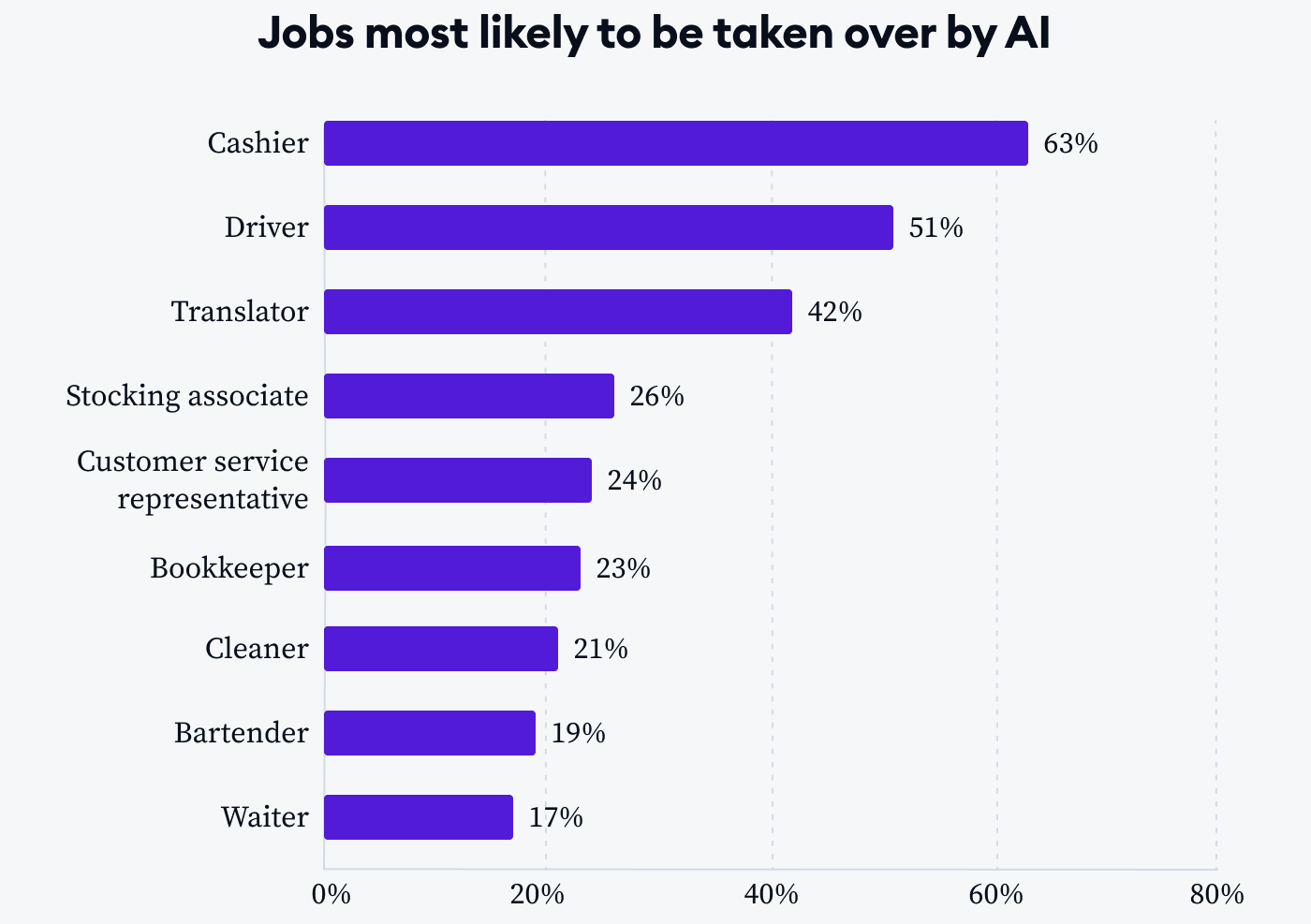
Source: Tidio
Transportation
The road to the future is paved with artificial intelligence, and it’s driving us towards a significant shift in transportation jobs.
AI and Driving Jobs
No need for a crystal ball to see that AI has its eyes set on the rearview mirror of professional drivers. From taxis to long-haul trucks, autonomous vehicles are gaining ground fast.
We’re not just talking about futuristic robot cars here. Even your regular Uber ride could soon be driverless thanks to companies like Waymo pushing boundaries every day.
The Impact on Logistics Coordinators
Moving from behind the wheel onto dry land doesn’t make you safe from AI either. Consider logistics coordinators who ensure the smooth operation of supply chains; they might find their roles transformed too.
Amazon’s automated warehouses, where robots sort packages faster than humans ever could, give us an idea of what this future looks like – efficient but perhaps less human-powered than before.
A Shift Towards Tech-Savvy Roles?
This isn’t necessarily bad news though. While some traditional transport jobs may disappear or change beyond recognition, new ones will emerge instead – think drone operators or autonomous vehicle technicians.
All said and done, adapting skills will become crucial as we navigate these changing times together. To stay ahead of the curve in our AI-driven world means continuous learning. Remember: even if technology changes gears quickly – so can we.
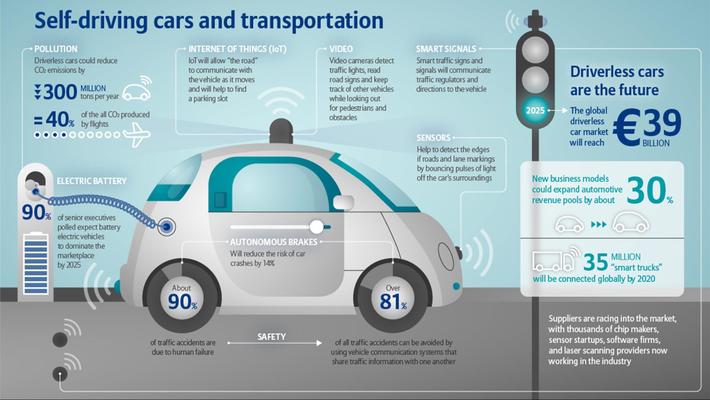
Source: Data Science Central
Healthcare
The future of healthcare may be more robotic than you think. AI’s capabilities are increasing, and roles such as medical transcriptionists and radiologists might see a shift.
Medical Transcriptionists
AI can now accurately convert speech into written text, making the role of medical transcriptionists vulnerable to automation. Medical records could soon be created directly from doctor-patient conversations with no need for human intervention.
This doesn’t mean that all hope is lost for this profession. Some experts argue that these jobs will evolve rather than disappear entirely, with professionals needed to oversee and correct AI outputs.
Radiologists
AI systems can analyze imaging data faster and more accurately than humans, potentially outperforming radiologists in certain tasks like identifying early-stage cancers.
This advancement doesn’t spell doom for radiology careers. Radiologists who adapt by learning how to work alongside these technologies could find their jobs becoming easier instead of redundant because they would handle complex cases while leaving routine scans to machines.
Remember: while it seems scary at first glance, change often brings opportunities too. Embracing technology advancements can help us navigate towards an even better future in healthcare.
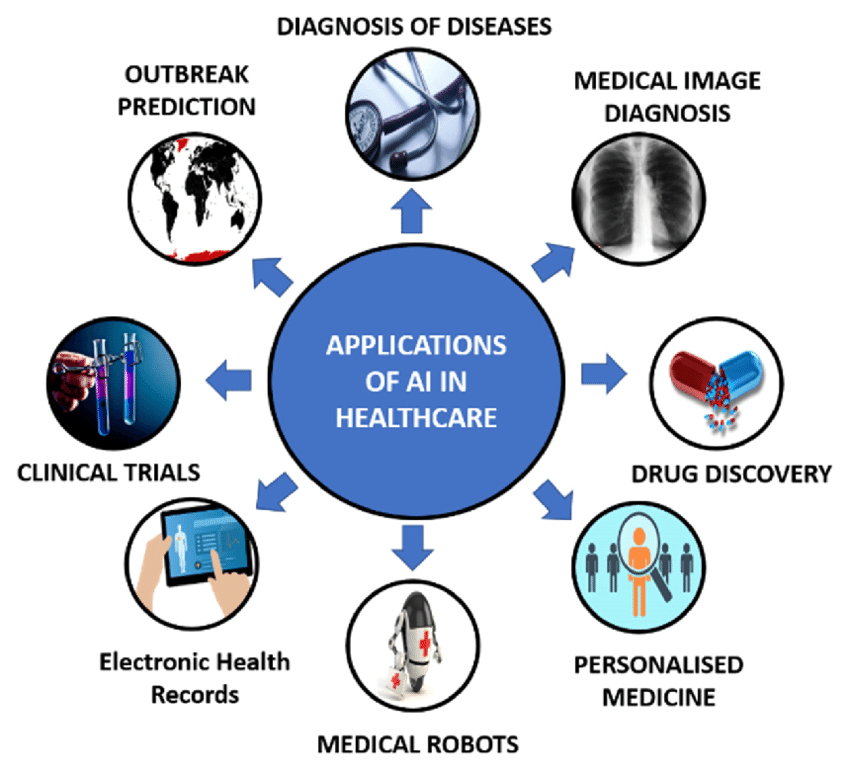
Source: ResearchGate
Finance
When we talk about AI’s influence on finance, the roles of financial advisors and analysts often come up. What does this signify in reality?
The AI Impact on Financial Advisors
A recent Forbes article suggests that robo-advisors could soon replace human ones.
This doesn’t mean you’ll be chatting with a robot about your 401k anytime soon. Instead, these tools use algorithms to make investment decisions based on data analysis.
Analyzing The Analysts’ Jobs
In addition to financial advisors, jobs for financial analysts may also be at risk due to advancements in artificial intelligence.
CNBC reported that banks are already using machine learning programs for tasks like reviewing loan documents – something previously done by humans.
It’s undeniable how AI technology has made things more efficient in the finance sector. From speeding up underwriting processes in insurance companies to helping predict market trends, it’s clear that there are both pros and cons when it comes to automation in finance.
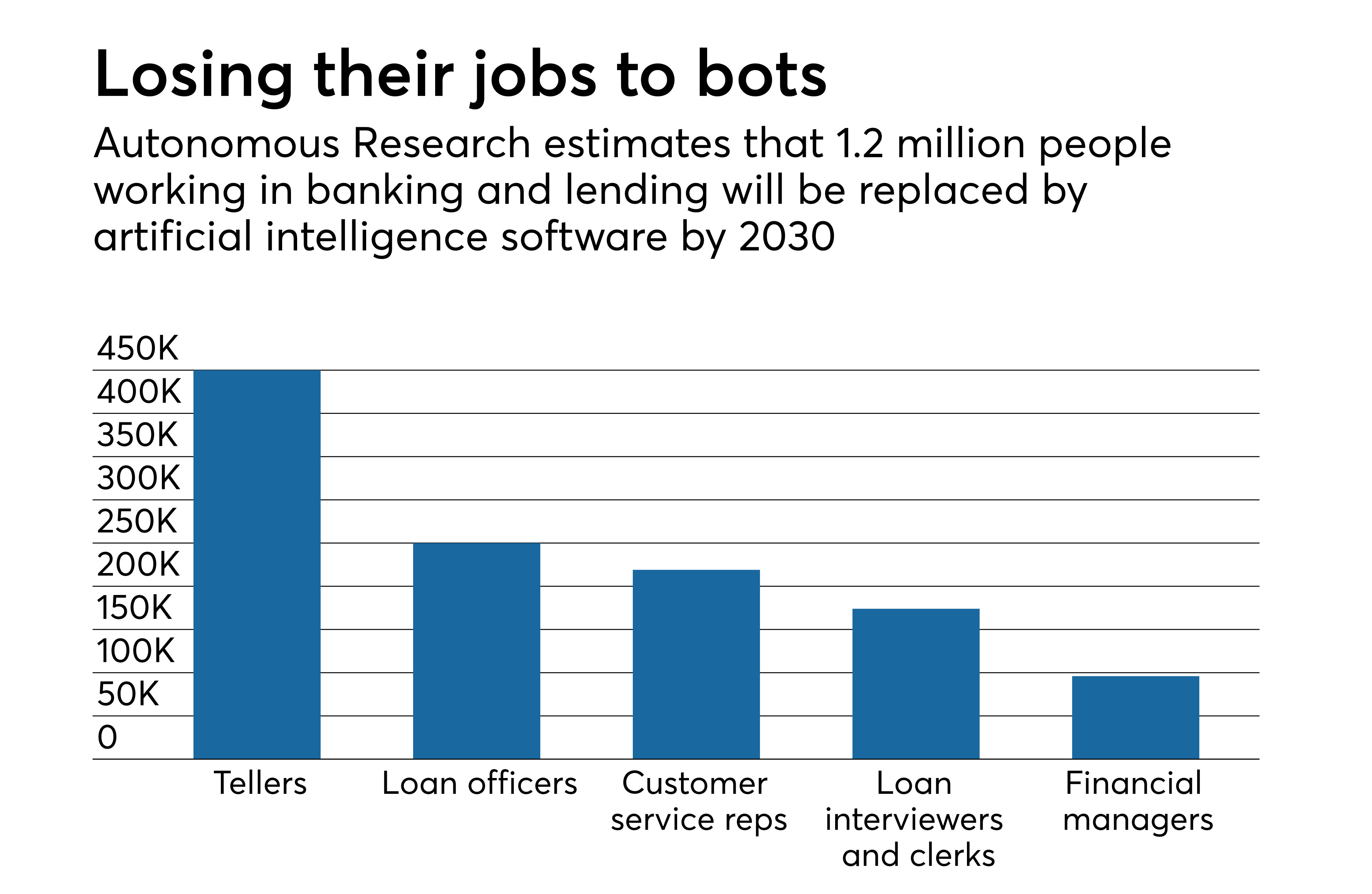
Source: American Banker
Retail
AI advancements are revolutionizing the retail sector. We’re seeing a surge in automated checkout systems and virtual shopping assistants, which may seem like they’ve been plucked straight out of sci-fi novels.
Automated Checkout Systems
The traditional cashier role is being replaced by automated self-checkout systems to improve in-store shopping experience. These AI-powered machines allow customers to scan items, bag them up, and pay without needing any help from human workers. It’s all about convenience and speed.
A downside? Some people worry that these technological developments will lead to job losses.
Virtual Shopping Assistants
Moving online, we see virtual shopping assistants starting to pop up on various platforms. You might have encountered one while browsing for clothes or tech gadgets.
These generative AI tools suggest products based on your preferences, answer questions about product details or delivery timescales, and even process transactions.
This technology aims to mimic the personalized service you’d get from an experienced sales associate – but does so 24 hours a day. Again, there’s concern over jobs as these digital helpers become more commonplace.
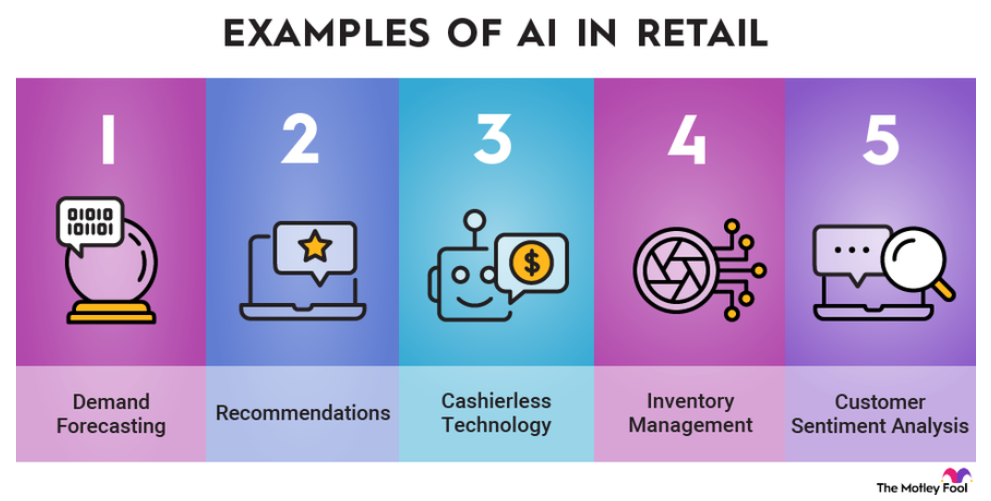
Source: The Motley Fool
Education
AI’s role in education is growing, but can it really replace teachers?
AI and Routine Tasks
AI can handle routine tasks like grading multiple-choice exams or checking homework for plagiarism.
An AI content marketing automation platform like BrandWell, which has a built-in plagiarism scanner, can help instructors write original lesson plans within minutes.
Thanks to AI handling repetitive tasks, teachers can focus more on one-on-one student interaction.
Tailored Learning Experiences
With the help of adaptive learning systems powered by AI, students get personalized study paths based on their unique needs.
This means no child gets left behind because they learn at a different pace than their peers.
The Human Touch in Teaching
But here’s where we hit a snag. While AI might make some aspects of teaching easier, there are things it simply cannot replicate – yet.
Critical thinking, creativity, empathy – these human traits are hard to automate. The ability to inspire students goes beyond just delivering information; it requires emotional intelligence too.
Mentorship Beyond Academics
A teacher plays many roles besides an instructor – mentor, guide, and counselor. They understand the emotions and struggles of students which an AI system would find difficult to comprehend.
Educators leave lasting impressions that shape our personalities and values over time — something not feasible with machines as per current technological advancements.
So while technology may change how we teach, it’s unlikely to replace the role of a teacher completely. They might use AI as a tool, but their value is much more than what can be automated.
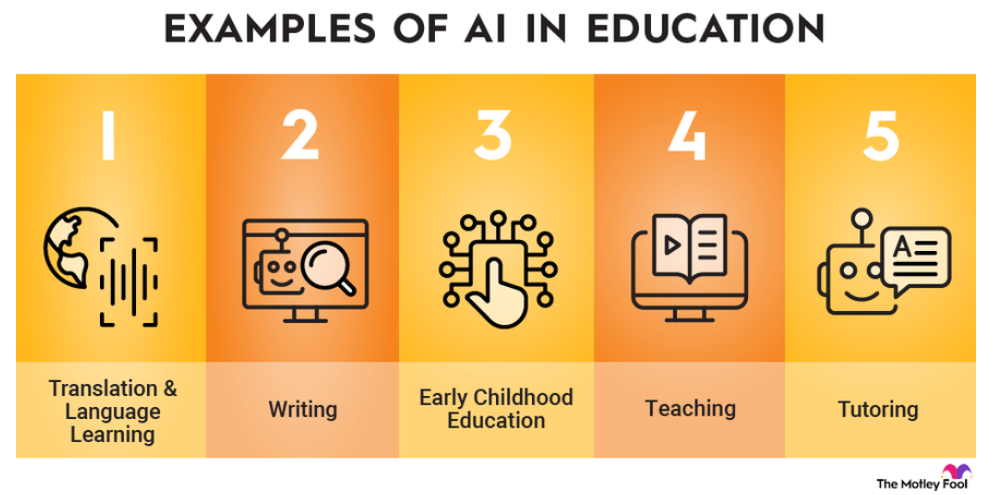
Source: The Motley Fool
Legal
You might be surprised, but even the legal sector isn’t immune to AI’s influence. A case in point is document review, traditionally a time-consuming task for paralegals.
No more sifting through mountains of paperwork. AI can now use machine learning to identify relevant documents swiftly and accurately. This not only saves precious hours but also reduces human error significantly.
Jurisprudence Analysis
Predicting court decisions has always been a bit like reading tea leaves. It’s becoming more straightforward than ever to forecast court rulings, with AI improvements. Tools like ROSS Intelligence, powered by IBM Watson, are already making waves in this field.
Evidence Discovery
Finding electronic information for use as evidence requires an army of tech-savvy lawyers; not anymore. Now there’s e-discovery software that makes finding specific emails or other digital artifacts easy peasy lemon squeezy.
All this talk about job replacement may seem daunting. However, let us flip the script here and consider how these changes could offer opportunities for upskilling within the legal profession.
Rather than replacing humans outrightly, these technologies aim at augmenting our capabilities – improving efficiency while reducing workload.
If you’re a law professional looking to stay ahead of the curve, start getting familiar with these tools today.
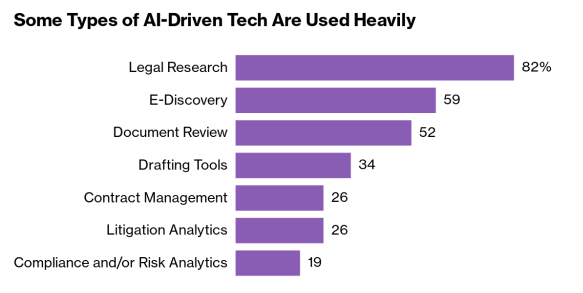
Source: Bloomberg Law
Customer Service
AI is making a big splash in customer service roles. The emergence of AI chatbots is causing a transformation in how companies interact with their customers.
Chatbots, programmed to simulate human conversation, are taking over certain roles traditionally done by humans. They’re efficient and available 24/7.
This means fewer late-night shifts for human operators and more instant responses for customers. It’s not just about replacing jobs but enhancing the service provided.
Making Customer Service More Efficient
No need to wait on hold or navigate complex phone trees with these bots around. They can help answer customer support questions, process orders, and even offer personalized recommendations based on user behavior data.
All this efficiency might make you worry if you work in customer service. But fear not.
Rather than simply cutting jobs, many experts believe AI will transform the job market instead. The introduction of chatbot technology allows staff members to focus more on tasks that require a personal touch or specialized knowledge —things bots aren’t quite ready for yet.
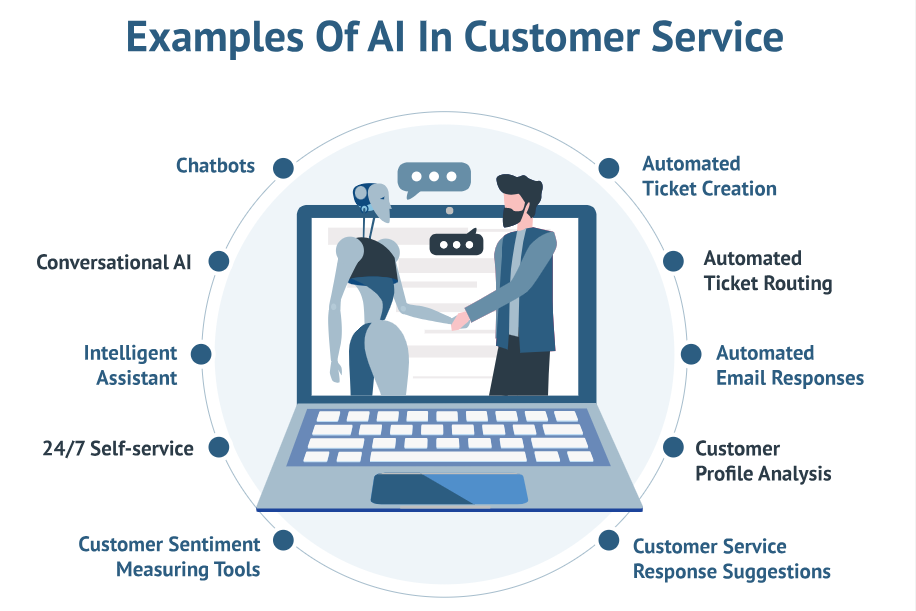
Source: Fit Small Business
Media and Marketing
AI is indeed transforming the landscape of art, design, entertainment, content creation, and marketing — automating certain tasks and processes and even displacing some creatives.
Here are some ways AI is impacting these sectors:
Art and Design
How long does it take for a painter to finish an artwork? With AI technologies sweeping the art world, you can now draw stunning images within minutes — even without design skills.
Meet the AI artists of the future. DALL-E, Bing Image Creator, and NightCafe are just some of the AI art generators that can produce amazing graphics from a simple text prompt.
Here’s an example of a portrait generated with automation tools:
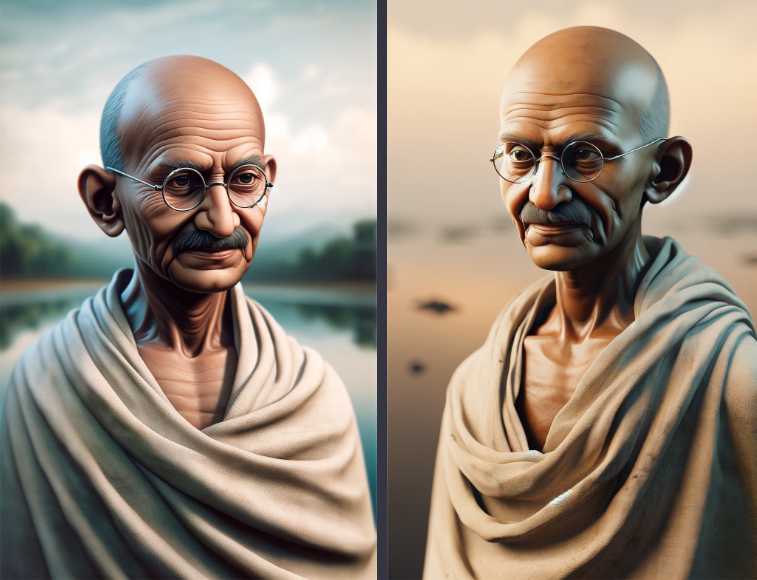
AI algorithms are used to optimize design layouts, suggesting color schemes, fonts, and image placements for visual appeal.
Graphic designers may find AI tools helpful in streamlining design processes, but their expertise in conceptualizing and bringing a unique artistic vision to life remains indispensable.
Content Creation
Generative AI algorithms can create content, including text, images, and videos. This is especially evident in automated content creation tools for social media, advertisements, and basic design elements.
Here’s an example of a long-form blog post written by BrandWell:
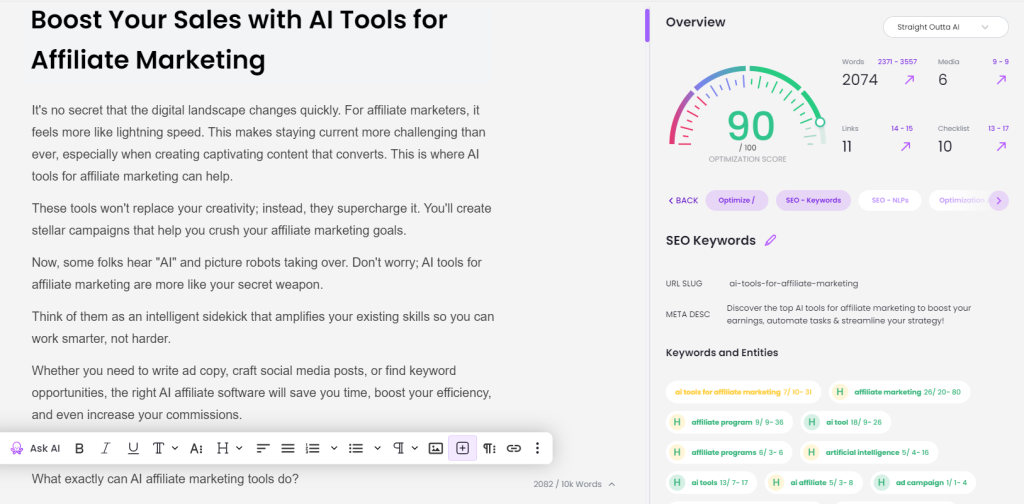
It only took the AI less than 3 minutes to write a 2,000-word article, with a full SEO suite to help human writers further optimize the post.
BrandWell can write any type of content you need, from blog articles and video scripts to advertising copy and marketing emails.
But while AI can automate certain aspects of content creation, it can never match the creativity, storytelling, and unique perspectives of a human content writer. Content creators are more likely to collaborate with AI tools to enhance efficiency rather than being entirely replaced.
Music Composition
AI systems can now compose music by analyzing patterns and styles from vast datasets.
However, only human musicians and composers can bring emotional depth, cultural understanding, and personal expression to each masterpiece. Collaboration between AI and musicians is likely to be more prevalent.
Moving Pictures
Film editing was once a tedious task but now AI can automate certain tasks such as cutting and arranging clips.
Video editors still play a crucial role in storytelling, creative decision-making, and the overall narrative of a video but AI tools help speed up routine tasks.
Journalism
Newspapers are not dying; they’re just going digital. With robot reporters taking charge like The Washington Post’s Heliograf or Bloomberg’s Cyborg, news outlets can publish hundreds of articles as they happen!
AI algorithms can generate news articles by analyzing data and summarizing information from various sources.
But while AI may automate routine news reporting, journalists play a crucial role in investigative journalism, in-depth analysis, and providing context that AI may lack.
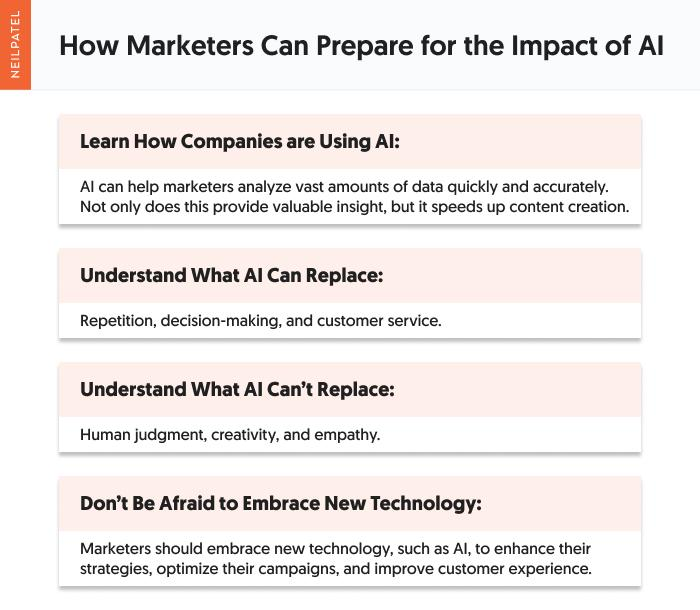
Source: Neil Patel
It’s important to note that while AI is automating certain tasks, it often complements human creativity rather than replacing full-time jobs entirely.
To survive the onslaught of AI, you need a combination of unique human insight, emotional intelligence, and a deep understanding of cultural nuances, alongside proficiency in using AI tools for enhanced efficiency.
Will My Job Be Replaced by AI?
While AI is advancing rapidly, there are certain jobs that, at least for the foreseeable future, are less likely to be fully replaced by automation. These jobs typically involve complex problem-solving skills, contextual knowledge, emotional intelligence, and creativity.
Here are some examples:
Creativity and Innovation Roles: Jobs that involve creative thinking such as artists, writers, graphic designers, and inventors rely on the human ability to generate novel ideas and make unique connections.
Emotionally Intelligent Professions: Roles that require empathy, compassion, and emotional intelligence, like therapists, counselors, social workers, and certain healthcare positions, involve a level of human understanding that AI currently lacks.
Human Resources and Management: HR professionals and managers often deal with intricate human interactions, conflict resolution, and strategic decision-making that involves a deep understanding of organizational dynamics.
Skilled Trades: Professions in skilled trades like plumbers, electricians, carpenters, and mechanics involve hands-on work and problem-solving that requires a practical understanding of complex systems.
Complex Decision-Making Professions: Jobs that require complex decision-making such as judges, top-level executives, and strategic planners involve a level of intuition and contextual understanding that AI currently struggles to replicate.
Human-Centric Healthcare Jobs: Roles in healthcare that involve direct patient care like nurses, doctors, and therapists require not only technical knowledge but also interpersonal skills, empathy, and the ability to respond to nuanced human needs.
Knowledge Transfer: Educators, trainers, and mentors play a crucial role in the transfer of knowledge to learners. The human connection and adaptability to the diverse needs of students are areas where AI falls short.
Artisanal and Craftsmanship Jobs: Professions that involve artisanal skills, craftsmanship, and attention to detail, such as handcrafted products or artisanal cuisine, require a human touch and creativity that AI lacks.
Physical Jobs in Unpredictable Environments: Jobs that involve physical work in unpredictable environments like search and rescue operations, firefighting, and certain maintenance roles require adaptability to unforeseen challenges.
While AI will certainly impact various aspects of work, these jobs highlight the areas where human skills, creativity, emotional intelligence, and adaptability remain irreplaceable. It’s important to note that as technology advances, the landscape may evolve and new ways of collaboration between humans and AI may emerge.
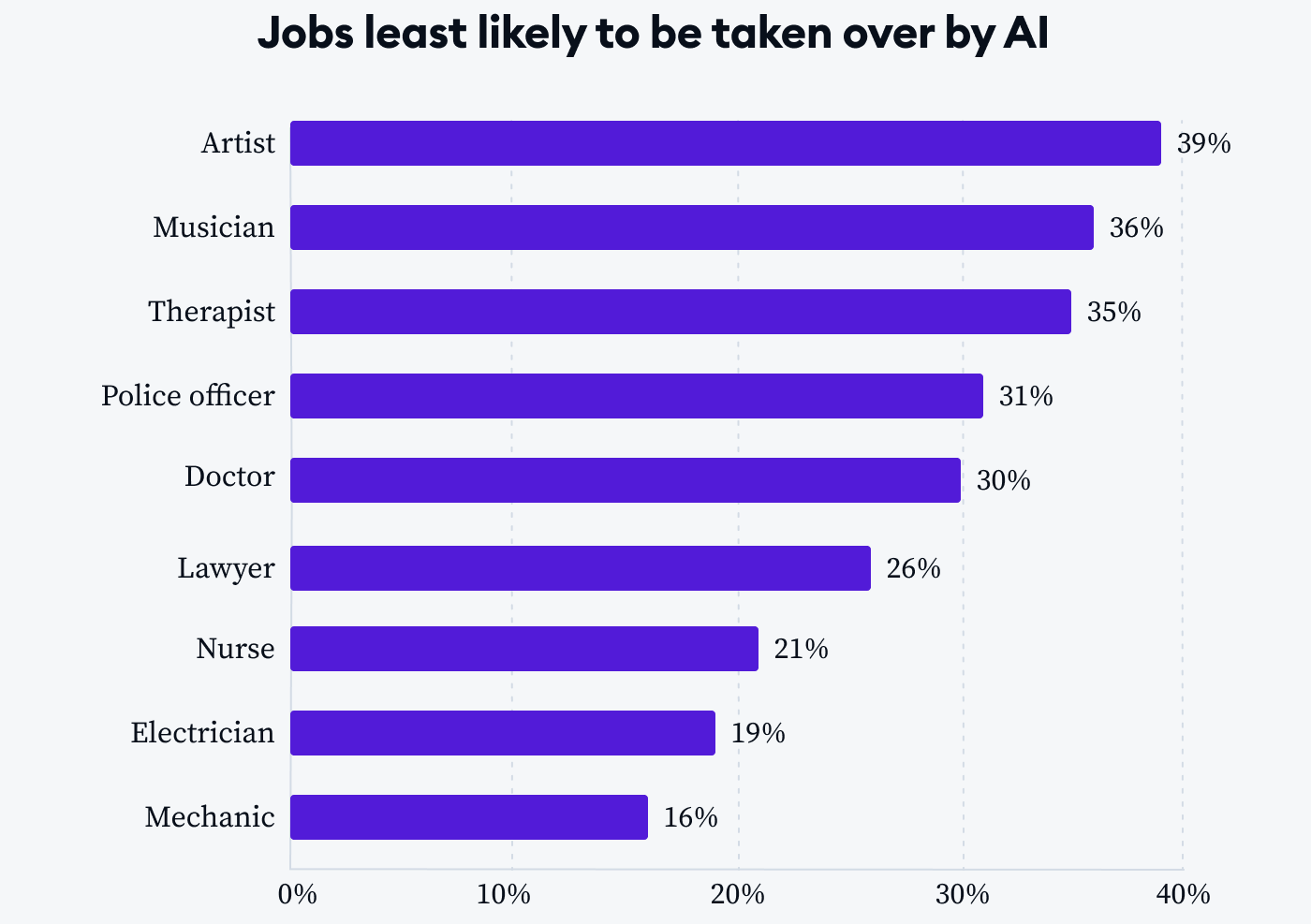
FAQs – What Jobs Will AI Replace?
What job is likely to be replaced by AI?
Jobs that involve routine, repetitive tasks like data entry or telemarketing are prime candidates for replacement by AI.
Which jobs are safe from AI?
Creative professionals such as artists, writers, and those needing a human touch like therapists seem safest from the reach of AI.
Will AI create more jobs than it destroys?
New technologies typically create new opportunities. So while some roles may vanish due to automation, others will spring up in response to advancements in tech.
AI and The Future of Work
From transportation to retail, we’ve taken a journey through various industries where AI is undeniably reshaping the world of work.
While concerns about job displacement persist, a closer look reveals that AI is more of a transformative force than a destroyer of jobs. The key lies in understanding the dynamic relationship between humans and AI and harnessing the strengths of each to make the workplace more efficient.
The ability of AI to automate repetitive tasks allows human workers to focus on higher-order skills such as creativity, critical thinking, emotional intelligence, and complex problem-solving.
Jobs that require a uniquely human touch, such as those in creative industries, caregiving, complex decision-making, and nuanced social interactions, are likely to remain indispensable.
AI is also a catalyst for the creation of new job categories. The demand for roles in AI development, system maintenance, and ethical oversight is on the rise, highlighting the evolving nature of employment in the AI era.
As we navigate this transformative period, it’s important to emphasize lifelong learning and adaptability. Continuous upskilling and reskilling initiatives are crucial components of a successful transition into the future of work.
If you’re a content creator, there is nothing to fear about AI. Content marketing automation tools like BrandWell are designed to make your job easier, not put you out of work. Sign up today to find out how AI can help you 10x your productivity, beat deadlines, and even become a better writer!